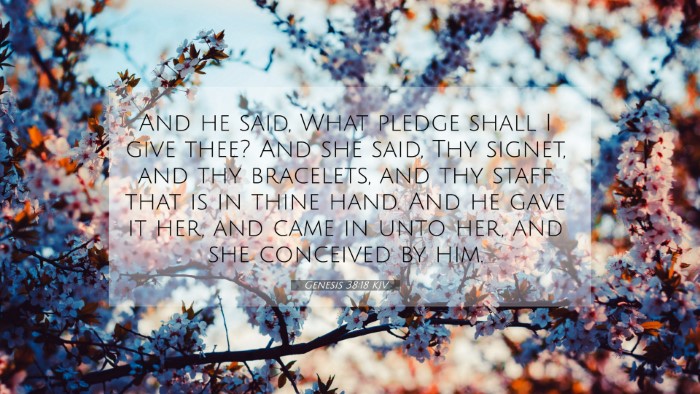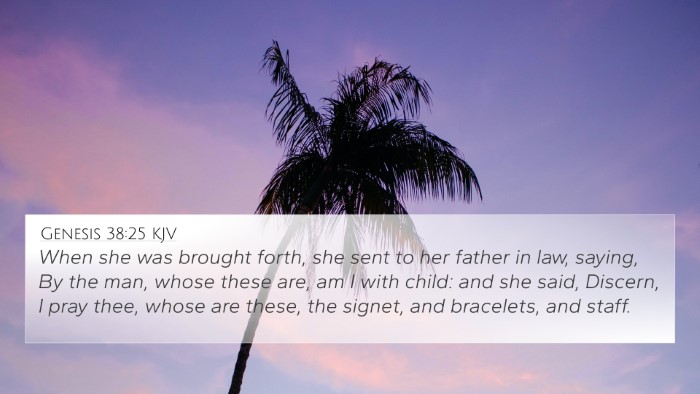Understanding Genesis 38:18
Genesis 38:18 provides a significant yet often overlooked narrative within the story of Judah and Tamar. This verse states:
"He said, 'What pledge shall I give you?' She answered, 'Your signet and your cord and the staff that is in your hand.' So he gave them to her and went in to her, and she conceived by him."
Summary of Context
The chapter recounts the account of Judah's interaction with his daughter-in-law, Tamar, after the death of his sons. Tamar, seeking justice, disguises herself to function in a role society denied her due to her circumstance. Understanding this verse requires examining the cultural implications and moral lessons conveyed by the narrative.
Commentary Insights
Matthew Henry's Commentary
Matthew Henry emphasizes the troubling nature of the circumstances surrounding this passage. He notes:
- The willingness of Judah to give his seal, cord, and staff indicates a significant commitment, as these items were indicative of his identity and authority.
- This act of deception leads to discussions regarding justice and righteousness, showcasing how complicated human relationships can be when intertwined with societal expectations and norms.
- Henry observes that Tamar's boldness in seeking her rights reflects a deep understanding of justice rather than shame.
Albert Barnes' Notes
Albert Barnes provides an analytical approach to the significance of the items exchanged, stating:
- The signet, cord, and staff can represent not just personal possession but also imply a sacred promise and fidelity, which shows Judah's recognition of his obligations.
- Barnes explains this verse's importance in showcasing the interplay between human failure and divine purpose; Tamar's act ultimately leads to the continuation of the line of Judah, from which David, and ultimately Christ, descends.
Adam Clarke's Commentary
Adam Clarke's insights uncover the emotional dynamics of the narrative:
- Clarke points out that the act of Tamar illustrates desperation, which resonates with the theme of female agency in the Bible.
- He also discusses the implications of this union, highlighting how Tamar’s actions lead to the lineage that plays a pivotal role in biblical history.
- Clarke underscores that although this situation appears morally ambiguous, it serves a divine purpose, reinforcing God's sovereignty over human affairs.
Cross-References for Deeper Understanding
To enrich the understanding of Genesis 38:18, here are several significant cross-references:
- Genesis 38:25: Tamar reveals Judah's possessions and the importance of justice.
- Leviticus 18:15: Discusses the prohibitions on relationships within family ties, highlighting societal norms.
- Matthew 1:3: Mention of Judah and Tamar in the genealogy of Jesus, showing divine orchestration.
- Ruth 4:12: The significance of lineage and redemption continues in the line of Judah.
- Hebrews 11:31: Tamar is recognized for her faith, revealing God's mercy in unexpected places.
- 2 Samuel 13:1-14: Another complex narrative involving family and sexual morality.
- Judges 14:1-3: Shows the tensions in marriages and inter-family relations.
Conclusion
This poignant episode of Genesis 38:18 serves not only as a historical account but also as an opportunity for deeper reflection on themes such as justice, desperation, and divine providence. The complexities present in this narrative, underscored by insights from Matthew Henry, Albert Barnes, and Adam Clarke, challenge us to consider the intertwining of human actions with God’s overarching plan.
Thematic Connections
In studying Genesis 38:18, one begins to see connections between various themes present in both the Old and New Testaments. These include:
- Justice versus societal norms.
- The role of women in biblical narratives.
- Divine sovereignty amidst human failings.
Understanding Genesis 38:18 and its cross-references are crucial for anyone interested in exploring the interconnectedness of Scripture, offering a comprehensive Bible cross-reference guide.






